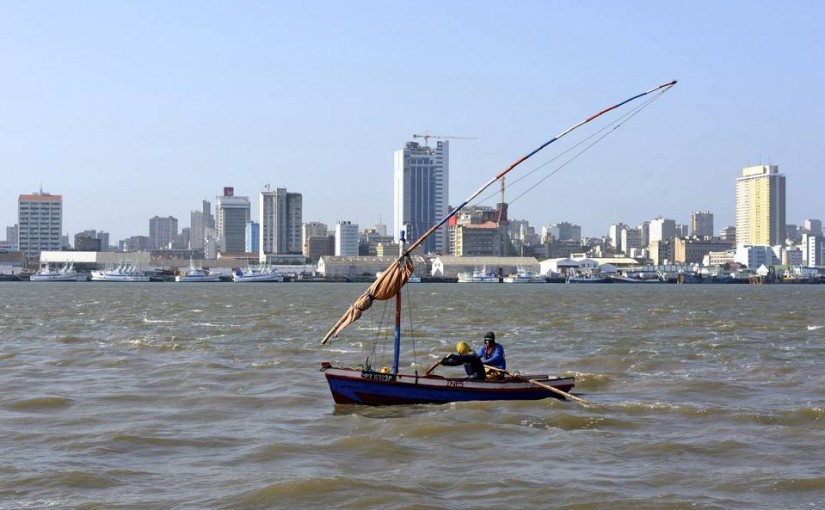Mozambique: MDM calls for Commission of Inquiry to investigate contract between government and ...
Tuna and Gunships: How $850 Million in Bonds Went Bad in Mozambique

Reuters / A traditional fishing boat plies the waters off the Mozambique capital of Maputo, as the tuna fleet sits in dock in the background.
Mozambique is becoming a case study on the perils of rushing into markets at the edge of the world’s financial system.
Global investors who in 2013 thought they were lending a state-owned company $850 million to buy a tuna fishing fleet learned within months that the funds had been diverted to buy ships for the navy. Two years later, they were told Mozambique intended to restructure the bonds, because the fishing company’s revenue wasn’t holding up.
Now, they are learning that Credit Suisse Group AG, which led the bond sale with a Russian bank, had made another sizable loan to Mozambique around the same time of the original bond sale.
The end result is that Mozambique is deeper in debt, paying higher interest on the new restructured bonds and weathering a downgrade of its credit rating to “selective default.” Investors are left with bonds that are likely worth less than they thought before learning about the other loans. And there still isn’t much to show in the way of tuna.
Buyers of the tuna bonds officially endorsed the restructuring Friday, with about 85% voting to accept the deal. The restructuring replaced debt that had originally yielded 8.5% with new government bonds yielding 14.4%. Standard & Poor’s Ratings Services cut its credit rating of Mozambican debt to selective default status Friday, calling the exchange “distressed.”
The episode presents another mess for Credit Suisse CEO Tidjane Thiam as he attempts to reduce the bank’s reliance on investment banking in risky markets. The bank managed the restructuring, which helped tie off the problem of the rapid failure of the original bonds it helped sell.
But investors want to know why they weren’t told about the other loans until after they had cast their votes for the restructuring. The loans made by Credit Suisse and other lenders—at least $787 million worth—could diminish the value of the new bonds.
“Why wasn’t it disclosed?” said Marcus Boeckmann, an emerging-market debt-fund manager at Candriam Investors Group in London, who participated in the bond exchange without knowing of the incremental loans. “That would clearly be a negative.”
While Credit Suisse didn’t inform bondholders of the existence of the loan until many had agreed to the restructuring late in March, it had included the debt in the calculation of Mozambique’s consolidated public debt that it provided to investors during the exchange, a person familiar with the offering said.
Between the bonds and loans, Credit Suisse and other banks helped Mozambique borrow at least $1.47 billion in 2013 alone, representing a 25% increase on the roughly $6 billion national debt reported at the end of 2012. The debt has become all the more onerous over the past year as Mozambique’s currency depreciated 29%. The government obtained a $289 million rescue loan from the International Monetary Fund in October to bolster its finances.
Investors chasing higher yields and the commodities boom rushed into Africa in recent years. When Mozambique, a country with rich offshore natural-gas deposits, proposed in 2013 to sell $850 million in government-guaranteed bonds for a new state-owned tuna fishing company, Credit Suisse and Russian bank VTB Group easily sold the debt to buyers that included big money managers like AllianceBernstein LP, Aberdeen Asset Management PLC and Franklin Templeton Investments.
The bonds were sold by a company called Empresa Mocambicana de Atum, or Ematum, over several months in 2013 ending in September. A preliminary offering document for the bonds gave a short description of how the proceeds would be used—for “the fishery activity of tuna and other fish resources”—and included no financial projections, according to a copy of the document reviewed by The Wall Street Journal. Fund managers said they invested in the deal without much knowledge of how the fishing company would operate because they trusted in the government guarantee backing the bonds.
Later in September, however, the contractor to build the tuna boats announced it also would be building expensive military speedboats. In public budgetary documents, the government said it had decided to split the funds into commercial and noncommercial uses.













Leave a Reply
Be the First to Comment!
You must be logged in to post a comment.
You must be logged in to post a comment.